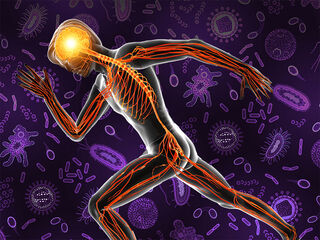Cognition
A Surprising Way That Exercise Improves Your Mind
Research shows that exercise improves your microbiota, boosting your mood.
Posted October 28, 2020 Reviewed by Gary Drevitch

Exercise is one of the best things you can do for your health, but it also has a surprising impact on your mood. That’s because there is an intriguing relationship between exercise, your gut microbes, and your brain. Research has found a correlation between the health of your gut and depression. This is the gut-brain axis and it is involved with your microbiota: the bacteria, fungi, and viruses that live in your gut.
A bad microbiota may lead to a leaky gut, which can allow toxins and bacteria to enter your bloodstream. Once there, your heart dutifully pumps these bad actors to every tissue in your body. Your immune system knows how to track down these interlopers and kill them, but if you are continuously leaking pathogens, you can become susceptible to chronic systemic inflammation. That can lead to some of the most intractable diseases we know of, including heart disease, diabetes, cancer, and more. It can also affect your brain, affecting cognition andmood and even leading to dementia.
The older you are, the worse it gets
In a recent article for the journal Geriatrics, Victoria Sanborn and John Gunstad of Kent State University point out that these mental problems are more troublesome in the elderly. They note that exercise prevents hypertension and improves vascular function, both of which are associated with better cognition. Exercise promotes the growth of nerve cells; the hippocampus, a brain structure involved in memory and cognition, actually grows in size with exercise. Exercise modulates insulin levels as well, potentially exerting a beneficial effect on diabetes and obesity, syndromes that co-occur often enough to earn the portmanteau “diabesity." Insulin resistance is behind type 2 diabetes, and a similar phenomenon occurs in the brain, leading some researchers to label Alzheimer’s disease type 3 diabetes.
Gunstad says, “Scientists are just starting to understand the many ways in which physical-activity-related changes to the gut microbiome might be linked to protecting the brain against memory loss and conditions like Alzheimer's disease. Initial studies suggest that reduced inflammation and improved insulin signaling within the brain are important, but more research is needed.”
Exercise also lowers inflammation, protecting the brain from injury. Inflammation may be the most important aspect of the exercise-gut-brain connection. Sanborn says, “Given our increasing understanding of the harmful effects of cardiovascular disease on the brain, the effects of physical activity and the gut microbiome on … inflammation may be the most impactful.”
The encouraging upshot is that exercise and a healthy gut can lead to better cognition and less depression and anxiety. But how is everything connected? The story is that exercise affects your gut microbes, increasing diversity and improving the ratios of good versus bad bacteria. Experiments in both animals and humans show that exercise improves the integrity of the gut lining. That implies that exercise can keep gut bacteria out of the bloodstream, and indeed athletes show lower blood levels of molecules associated with bacterial infection.
How does exercise affect the microbiota? Gunstad and Sanborn point to bile acids, which are released to help digest fats and oils. Exercise affects bile acid levels, and that can encourage certain bacteria at the expense of others. As well as consuming bile acids, microbes can also produce so-called “secondary” bile acids. In a complex cascade, those secondary acids can also be consumed by other microbes. Sanborn says, “The connections between physical activity, the gut microbiome, and the brain are complex and it is important to clarify which interventions for the gut microbiome provide the greatest cognitive gains and whether these methods lead to other brain-based benefits as well, like improving mood or sleep.”
Keep in mind, your gut microbes are also affected by diet. Make sure you get plenty of fiber, which promotes the growth of beneficial bacteria along with exercise.
Metabolites are key
The microbes in our gut are engaged in continuous conversation in the form of small molecules called metabolites. One of the most potent metabolites is butyrate, a fatty acid that is a coveted food for the cells lining the gut. Butyrate has many knock-on effects, including melatonin production and nerve growth. These chemicals have a calming effect on your immune system, tamping down inflammation. Exercise is correlated with an increase in bacteria that produce butyrate, which can then optimize the proper functioning of your gut.
Metabolites allow bacteria to talk with each other, as well as with us. Amazingly, bacteria can produce neurotransmitters, the brain molecules that let nerve cells communicate. Those metabolites and neurotransmitters are also affected by exercise.
In 2017, Carlo Bressa, María Bailén-Andrino, and colleagues at the European University in Madrid showed that active women had higher levels of healthy microbes than did sedentary women. These microbes weren’t your standard probiotics, which generally resemble yogurt bacteria like Lactobacillus and Bifidobacteria. Instead, they are lesser-known species like Faecalibacterium prausnitzii, Roseburia hominis and Akkermansia muciniphila. These bacteria are boosted in athletes and depleted in people with obesity or diabetes.
What do we mean by exercise?
There are thousands of ways to exercise. Physical activity starts with getting out of your chair. You can exercise with plenty of oxygen getting to your muscles, as in brisk walking, tennis, or running. That’s cardio, or aerobic exercise. Additionally, you can push it with intense workouts like weight lifting or sprinting that tear down and rebuild your muscles. That’s anaerobic exercise. Because these both improve heart and vascular function, they are both beneficial for cognition. But other exercises like tai chi or yoga that purposely try to bring your mind into the exercise can also improve cognition.
All of these exercises increase your good microbes and improve diversity, thereby improving gut integrity and lowering inflammation. An hour or two a week, depending on intensity, can improve your health dramatically. Sanborn says, “This research shows that, when it comes to physical activity, the more the better. The greatest benefits for brain health come from moderate-to-vigorous exercise, so engaging in fun activities like biking, walking, or tennis are excellent ways to help keep our brain healthy.”
The results were compelling enough to convince the researchers to change their own lifestyles. Sanborn says, “This research has helped me fully appreciate that exercise does not just benefit the body, but can notably improve brain functioning too. I have certainly increased the amount of time I spend being physically active.”
Gunstad agrees: “Research in this area serves as a good reminder that even small changes in our habits can have a big impact on keeping our body and brain healthy as we get older. Other projects are starting to look at ways to tailor diet and exercise patterns to best protect the brain across the lifespan, with the goal of developing plans that are personalized to each individual.”
It can be tough to get off the sofa, but the benefits are clear. Not only will your body get into better shape, but you’ll feel better and think better too.
References
Sanborn, Victoria, and John Gunstad. “The Potential Mediation of the Effects of Physical Activity on Cognitive Function by the Gut Microbiome.” Geriatrics 5, no. 4 (September 25, 2020): 63.
Bressa, Carlo, María Bailén-Andrino, Jennifer Pérez-Santiago, Rocío González-Soltero, Margarita Pérez, Maria Gregoria Montalvo-Lominchar, Jose Luis Maté-Muñoz, Raúl Domínguez, Diego Moreno, and Mar Larrosa. “Differences in Gut Microbiota Profile between Women with Active Lifestyle and Sedentary Women.” PLOS ONE 12, no. 2 (February 10, 2017): e0171352.




